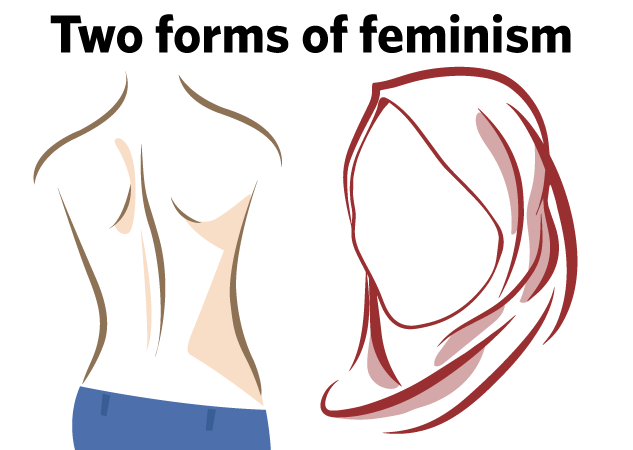Speaker connects feminism, Islam
Nov 10, 2016
The space was electric.
A diverse group of students gathered in the Illini Union, anticipating an eye-opening, charged discussion. Feminism was the topic; interconnectivity was the desired result.
The student association United Muslims and Minority Advocates, UMMA, held a discussion last week about two controversial topics: Islam and femininity. The goal was to counter preconceived notions of Islam and their stance on women’s rights.
Hoda Katebi served as the keynote speaker. As an activist and blogger, while representing Council American Islamic Relations, CAIR Chicago, she spoke of personal experiences that sparked her desire to advocate for social reform.
She recounts the hardships she faced when she decided to begin wearing the hijab in sixth grade. They were some of the worst days of her life she said.
Get The Daily Illini in your inbox!
“I was physically assaulted,” she said. “People punched me in the face, people pulled off my scarf and called me a terrorist left and right.”
This personal defeat sparked her need for social advocacy. Since then, the passion and upset of her past has fueled her need to yell and let her voice be heard — forging her own identity.
Katebi used her personal experience as a framework to discuss universal feminism. She indenitfies as a feminist which ruffles a lot of feathers both within the Muslim community and beyond. She spoke about how society views Islam and feminism as two mutually exclusive entities.
“Anytime I give a talk, people are like ‘how can you wear a hijab and be a feminist — is that not contradictory to you? Doesn’t your religion stone women? Doesn’t your religion do these terrible things?’”
Through her lecture, Katebi aimed to illuminate the contradictory relationship between mainstream western feminism and general women’s rights. She considers the current feminist viewpoint to be patriarchal.
“The word ‘feminism’ is a Western construct. Not the idea of women’s rights, but the term of ‘feminism,’” Katebi said.This discrepancy between two different forms of feminism served as the focal point of her lecture.
“When we combine the word feminism with images of naked women protesting Mosques, obviously there is going to be a backlash as to what (Muslims) assume to be feminist,” Katebi said.
Katebi said the notion of ‘white feminism’ is a version of feminism that primarily protects interests of white women, though it is not viewed as an oppressive force in American society.
She views feminism as the equal celebration of all men and women. This achieves equality and recognizes the importance of difference.
“The Muslims going against feminism is rooted in real concerns of not wanting to have this imperialist word and baggage,” Katebi said. “By saying that the Middle East isn’t feminist, it is problematic because it erases all of the women who are doing amazing work in the Middle East.”
Maryam Sultan, student in LAS and president of UMMA, sees social equality in verses of the Islamic holy book, the Quran.
According to Sultan, Islam has historically supported women’s rights. She also looked at western feminism with a postcolonial lens.
“In this case — the other is the east, the other is Islam. For the west to define themselves as feminist, they have to define the east as anti-feminist.”
Chris Maden, chair of the Champaign County Libertarian party, said feminism gives liberty to the people in making decision. For him, this remains true even when an oppressive culture comes into the picture.
“To the extent anyone male or female makes an informed voluntary consensual choice about their own lives, whether it is what they wear or do in their personal lives — that’s their decision to make,” Maden said.
Maden further describes that feminism comes in a variety of forms.
Katebi calls for student groups to promote dialogue and inclusion on campus.
“If we aren’t defining our own narrative, who is? If we aren’t going to be standing up, who is?” Katebi said. “Right now, people who are in power and have all the power are constantly forging an identity for us. We cannot let our oppressors define us. Don’t let them define you, but rather shape you.”






